Ethical Implications of Depreciation Method Change at Sunshine Limited
VerifiedAdded on 2020/05/16
|9
|2409
|66
Essay
AI Summary
The case of Sunshine Limited highlights significant ethical concerns in accounting practices. The company changed its depreciation method without adequate disclosure, violating AASB 116 provisions and undermining corporate governance principles. This breach affects stakeholder trust and financial transparency. Recommendations include disclosing changes in notes to accounts and consulting auditors for corrective measures. Adhering to these steps will align the company with ethical standards and restore confidence among stakeholders.
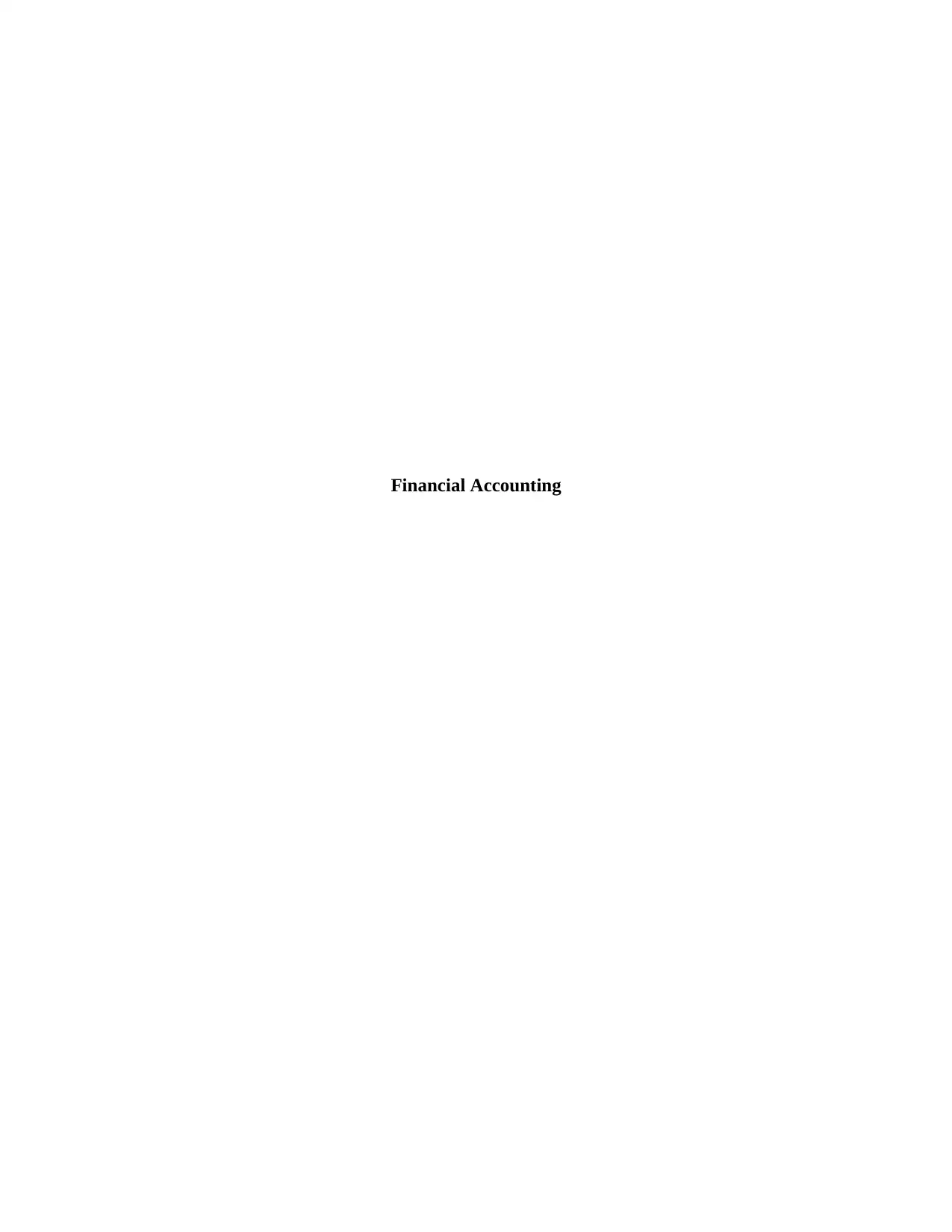
Financial Accounting
Paraphrase This Document
Need a fresh take? Get an instant paraphrase of this document with our AI Paraphraser
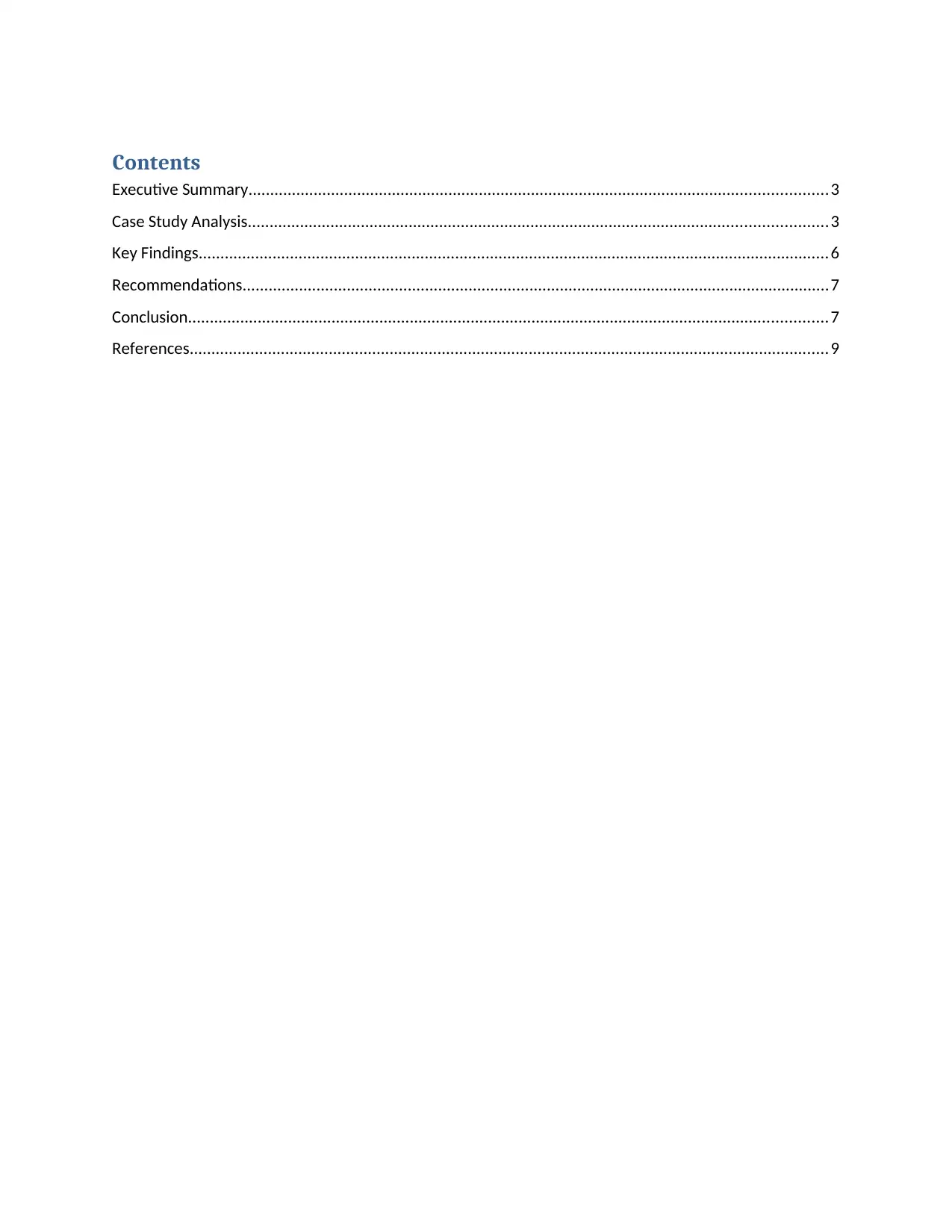
Contents
Executive Summary.....................................................................................................................................3
Case Study Analysis.....................................................................................................................................3
Key Findings.................................................................................................................................................6
Recommendations.......................................................................................................................................7
Conclusion...................................................................................................................................................7
References...................................................................................................................................................9
Executive Summary.....................................................................................................................................3
Case Study Analysis.....................................................................................................................................3
Key Findings.................................................................................................................................................6
Recommendations.......................................................................................................................................7
Conclusion...................................................................................................................................................7
References...................................................................................................................................................9
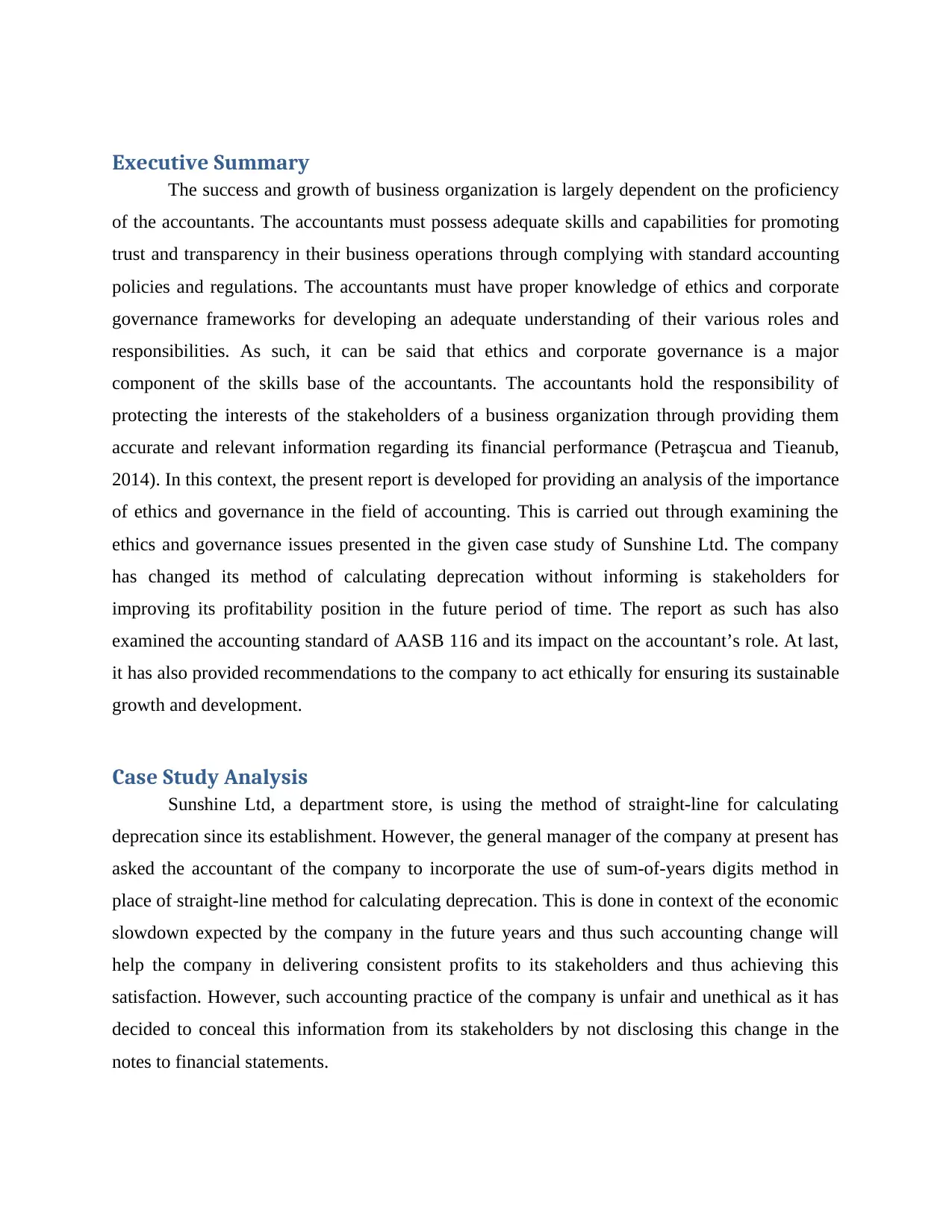
Executive Summary
The success and growth of business organization is largely dependent on the proficiency
of the accountants. The accountants must possess adequate skills and capabilities for promoting
trust and transparency in their business operations through complying with standard accounting
policies and regulations. The accountants must have proper knowledge of ethics and corporate
governance frameworks for developing an adequate understanding of their various roles and
responsibilities. As such, it can be said that ethics and corporate governance is a major
component of the skills base of the accountants. The accountants hold the responsibility of
protecting the interests of the stakeholders of a business organization through providing them
accurate and relevant information regarding its financial performance (Petraşcua and Tieanub,
2014). In this context, the present report is developed for providing an analysis of the importance
of ethics and governance in the field of accounting. This is carried out through examining the
ethics and governance issues presented in the given case study of Sunshine Ltd. The company
has changed its method of calculating deprecation without informing is stakeholders for
improving its profitability position in the future period of time. The report as such has also
examined the accounting standard of AASB 116 and its impact on the accountant’s role. At last,
it has also provided recommendations to the company to act ethically for ensuring its sustainable
growth and development.
Case Study Analysis
Sunshine Ltd, a department store, is using the method of straight-line for calculating
deprecation since its establishment. However, the general manager of the company at present has
asked the accountant of the company to incorporate the use of sum-of-years digits method in
place of straight-line method for calculating deprecation. This is done in context of the economic
slowdown expected by the company in the future years and thus such accounting change will
help the company in delivering consistent profits to its stakeholders and thus achieving this
satisfaction. However, such accounting practice of the company is unfair and unethical as it has
decided to conceal this information from its stakeholders by not disclosing this change in the
notes to financial statements.
The success and growth of business organization is largely dependent on the proficiency
of the accountants. The accountants must possess adequate skills and capabilities for promoting
trust and transparency in their business operations through complying with standard accounting
policies and regulations. The accountants must have proper knowledge of ethics and corporate
governance frameworks for developing an adequate understanding of their various roles and
responsibilities. As such, it can be said that ethics and corporate governance is a major
component of the skills base of the accountants. The accountants hold the responsibility of
protecting the interests of the stakeholders of a business organization through providing them
accurate and relevant information regarding its financial performance (Petraşcua and Tieanub,
2014). In this context, the present report is developed for providing an analysis of the importance
of ethics and governance in the field of accounting. This is carried out through examining the
ethics and governance issues presented in the given case study of Sunshine Ltd. The company
has changed its method of calculating deprecation without informing is stakeholders for
improving its profitability position in the future period of time. The report as such has also
examined the accounting standard of AASB 116 and its impact on the accountant’s role. At last,
it has also provided recommendations to the company to act ethically for ensuring its sustainable
growth and development.
Case Study Analysis
Sunshine Ltd, a department store, is using the method of straight-line for calculating
deprecation since its establishment. However, the general manager of the company at present has
asked the accountant of the company to incorporate the use of sum-of-years digits method in
place of straight-line method for calculating deprecation. This is done in context of the economic
slowdown expected by the company in the future years and thus such accounting change will
help the company in delivering consistent profits to its stakeholders and thus achieving this
satisfaction. However, such accounting practice of the company is unfair and unethical as it has
decided to conceal this information from its stakeholders by not disclosing this change in the
notes to financial statements.
⊘ This is a preview!⊘
Do you want full access?
Subscribe today to unlock all pages.

Trusted by 1+ million students worldwide
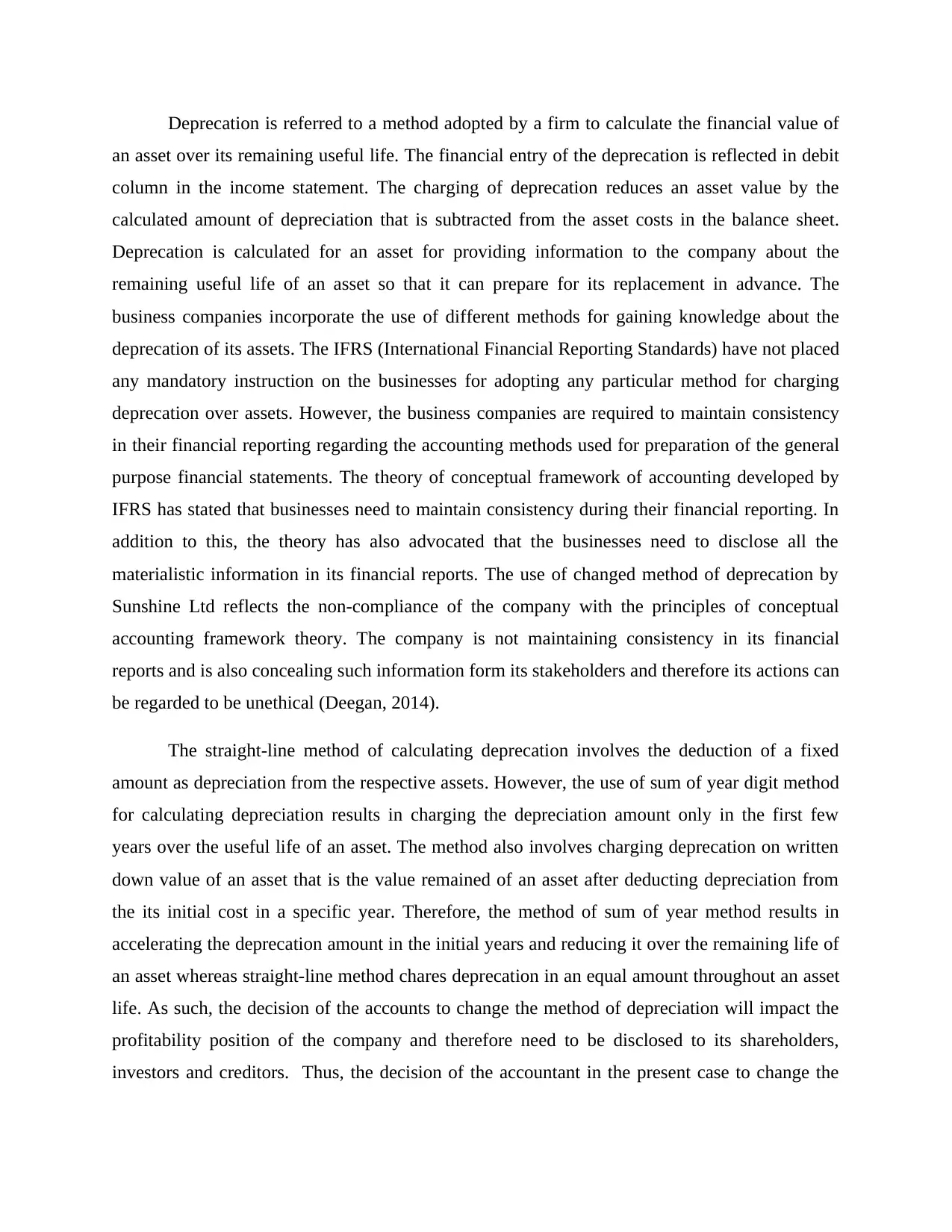
Deprecation is referred to a method adopted by a firm to calculate the financial value of
an asset over its remaining useful life. The financial entry of the deprecation is reflected in debit
column in the income statement. The charging of deprecation reduces an asset value by the
calculated amount of depreciation that is subtracted from the asset costs in the balance sheet.
Deprecation is calculated for an asset for providing information to the company about the
remaining useful life of an asset so that it can prepare for its replacement in advance. The
business companies incorporate the use of different methods for gaining knowledge about the
deprecation of its assets. The IFRS (International Financial Reporting Standards) have not placed
any mandatory instruction on the businesses for adopting any particular method for charging
deprecation over assets. However, the business companies are required to maintain consistency
in their financial reporting regarding the accounting methods used for preparation of the general
purpose financial statements. The theory of conceptual framework of accounting developed by
IFRS has stated that businesses need to maintain consistency during their financial reporting. In
addition to this, the theory has also advocated that the businesses need to disclose all the
materialistic information in its financial reports. The use of changed method of deprecation by
Sunshine Ltd reflects the non-compliance of the company with the principles of conceptual
accounting framework theory. The company is not maintaining consistency in its financial
reports and is also concealing such information form its stakeholders and therefore its actions can
be regarded to be unethical (Deegan, 2014).
The straight-line method of calculating deprecation involves the deduction of a fixed
amount as depreciation from the respective assets. However, the use of sum of year digit method
for calculating depreciation results in charging the depreciation amount only in the first few
years over the useful life of an asset. The method also involves charging deprecation on written
down value of an asset that is the value remained of an asset after deducting depreciation from
the its initial cost in a specific year. Therefore, the method of sum of year method results in
accelerating the deprecation amount in the initial years and reducing it over the remaining life of
an asset whereas straight-line method chares deprecation in an equal amount throughout an asset
life. As such, the decision of the accounts to change the method of depreciation will impact the
profitability position of the company and therefore need to be disclosed to its shareholders,
investors and creditors. Thus, the decision of the accountant in the present case to change the
an asset over its remaining useful life. The financial entry of the deprecation is reflected in debit
column in the income statement. The charging of deprecation reduces an asset value by the
calculated amount of depreciation that is subtracted from the asset costs in the balance sheet.
Deprecation is calculated for an asset for providing information to the company about the
remaining useful life of an asset so that it can prepare for its replacement in advance. The
business companies incorporate the use of different methods for gaining knowledge about the
deprecation of its assets. The IFRS (International Financial Reporting Standards) have not placed
any mandatory instruction on the businesses for adopting any particular method for charging
deprecation over assets. However, the business companies are required to maintain consistency
in their financial reporting regarding the accounting methods used for preparation of the general
purpose financial statements. The theory of conceptual framework of accounting developed by
IFRS has stated that businesses need to maintain consistency during their financial reporting. In
addition to this, the theory has also advocated that the businesses need to disclose all the
materialistic information in its financial reports. The use of changed method of deprecation by
Sunshine Ltd reflects the non-compliance of the company with the principles of conceptual
accounting framework theory. The company is not maintaining consistency in its financial
reports and is also concealing such information form its stakeholders and therefore its actions can
be regarded to be unethical (Deegan, 2014).
The straight-line method of calculating deprecation involves the deduction of a fixed
amount as depreciation from the respective assets. However, the use of sum of year digit method
for calculating depreciation results in charging the depreciation amount only in the first few
years over the useful life of an asset. The method also involves charging deprecation on written
down value of an asset that is the value remained of an asset after deducting depreciation from
the its initial cost in a specific year. Therefore, the method of sum of year method results in
accelerating the deprecation amount in the initial years and reducing it over the remaining life of
an asset whereas straight-line method chares deprecation in an equal amount throughout an asset
life. As such, the decision of the accounts to change the method of depreciation will impact the
profitability position of the company and therefore need to be disclosed to its shareholders,
investors and creditors. Thus, the decision of the accountant in the present case to change the
Paraphrase This Document
Need a fresh take? Get an instant paraphrase of this document with our AI Paraphraser
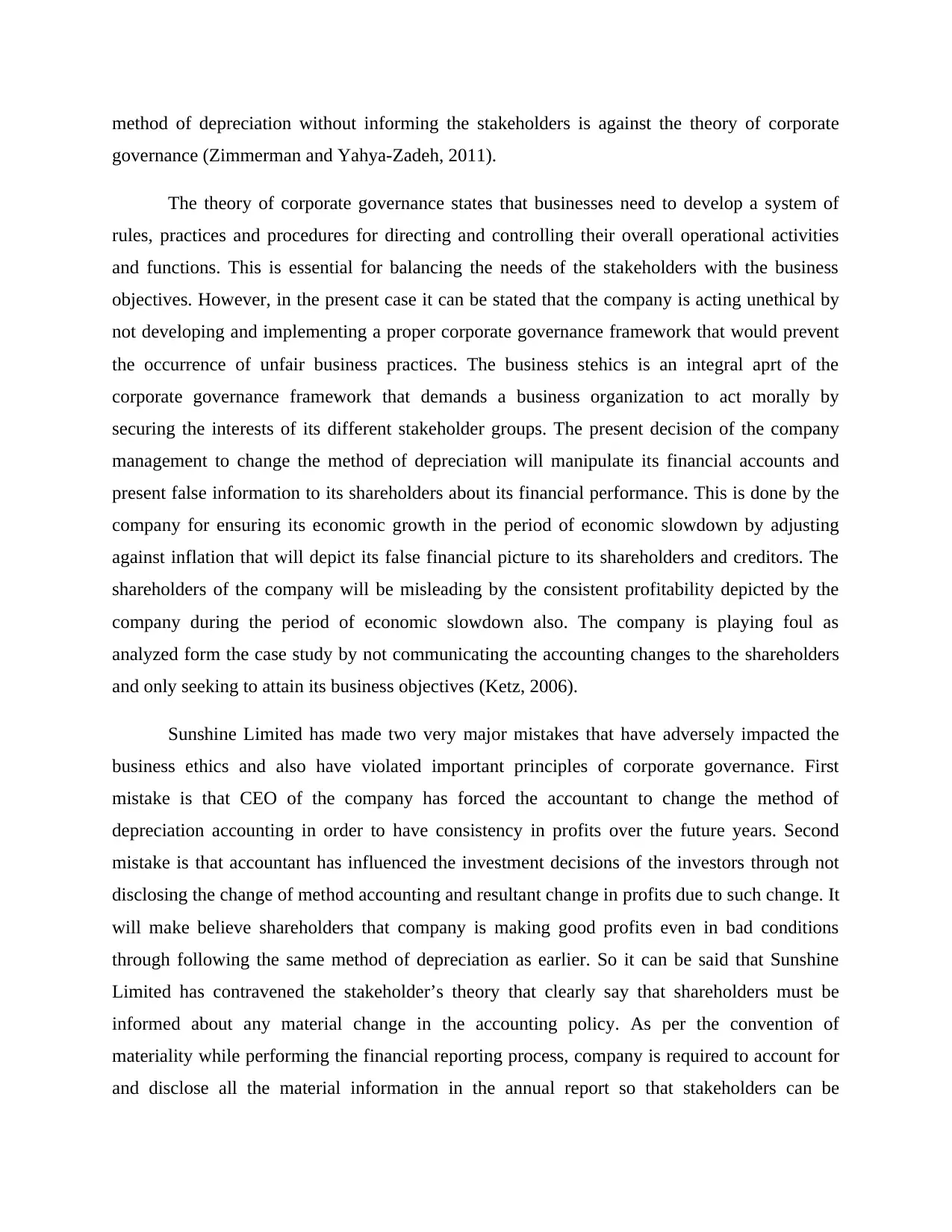
method of depreciation without informing the stakeholders is against the theory of corporate
governance (Zimmerman and Yahya-Zadeh, 2011).
The theory of corporate governance states that businesses need to develop a system of
rules, practices and procedures for directing and controlling their overall operational activities
and functions. This is essential for balancing the needs of the stakeholders with the business
objectives. However, in the present case it can be stated that the company is acting unethical by
not developing and implementing a proper corporate governance framework that would prevent
the occurrence of unfair business practices. The business stehics is an integral aprt of the
corporate governance framework that demands a business organization to act morally by
securing the interests of its different stakeholder groups. The present decision of the company
management to change the method of depreciation will manipulate its financial accounts and
present false information to its shareholders about its financial performance. This is done by the
company for ensuring its economic growth in the period of economic slowdown by adjusting
against inflation that will depict its false financial picture to its shareholders and creditors. The
shareholders of the company will be misleading by the consistent profitability depicted by the
company during the period of economic slowdown also. The company is playing foul as
analyzed form the case study by not communicating the accounting changes to the shareholders
and only seeking to attain its business objectives (Ketz, 2006).
Sunshine Limited has made two very major mistakes that have adversely impacted the
business ethics and also have violated important principles of corporate governance. First
mistake is that CEO of the company has forced the accountant to change the method of
depreciation accounting in order to have consistency in profits over the future years. Second
mistake is that accountant has influenced the investment decisions of the investors through not
disclosing the change of method accounting and resultant change in profits due to such change. It
will make believe shareholders that company is making good profits even in bad conditions
through following the same method of depreciation as earlier. So it can be said that Sunshine
Limited has contravened the stakeholder’s theory that clearly say that shareholders must be
informed about any material change in the accounting policy. As per the convention of
materiality while performing the financial reporting process, company is required to account for
and disclose all the material information in the annual report so that stakeholders can be
governance (Zimmerman and Yahya-Zadeh, 2011).
The theory of corporate governance states that businesses need to develop a system of
rules, practices and procedures for directing and controlling their overall operational activities
and functions. This is essential for balancing the needs of the stakeholders with the business
objectives. However, in the present case it can be stated that the company is acting unethical by
not developing and implementing a proper corporate governance framework that would prevent
the occurrence of unfair business practices. The business stehics is an integral aprt of the
corporate governance framework that demands a business organization to act morally by
securing the interests of its different stakeholder groups. The present decision of the company
management to change the method of depreciation will manipulate its financial accounts and
present false information to its shareholders about its financial performance. This is done by the
company for ensuring its economic growth in the period of economic slowdown by adjusting
against inflation that will depict its false financial picture to its shareholders and creditors. The
shareholders of the company will be misleading by the consistent profitability depicted by the
company during the period of economic slowdown also. The company is playing foul as
analyzed form the case study by not communicating the accounting changes to the shareholders
and only seeking to attain its business objectives (Ketz, 2006).
Sunshine Limited has made two very major mistakes that have adversely impacted the
business ethics and also have violated important principles of corporate governance. First
mistake is that CEO of the company has forced the accountant to change the method of
depreciation accounting in order to have consistency in profits over the future years. Second
mistake is that accountant has influenced the investment decisions of the investors through not
disclosing the change of method accounting and resultant change in profits due to such change. It
will make believe shareholders that company is making good profits even in bad conditions
through following the same method of depreciation as earlier. So it can be said that Sunshine
Limited has contravened the stakeholder’s theory that clearly say that shareholders must be
informed about any material change in the accounting policy. As per the convention of
materiality while performing the financial reporting process, company is required to account for
and disclose all the material information in the annual report so that stakeholders can be
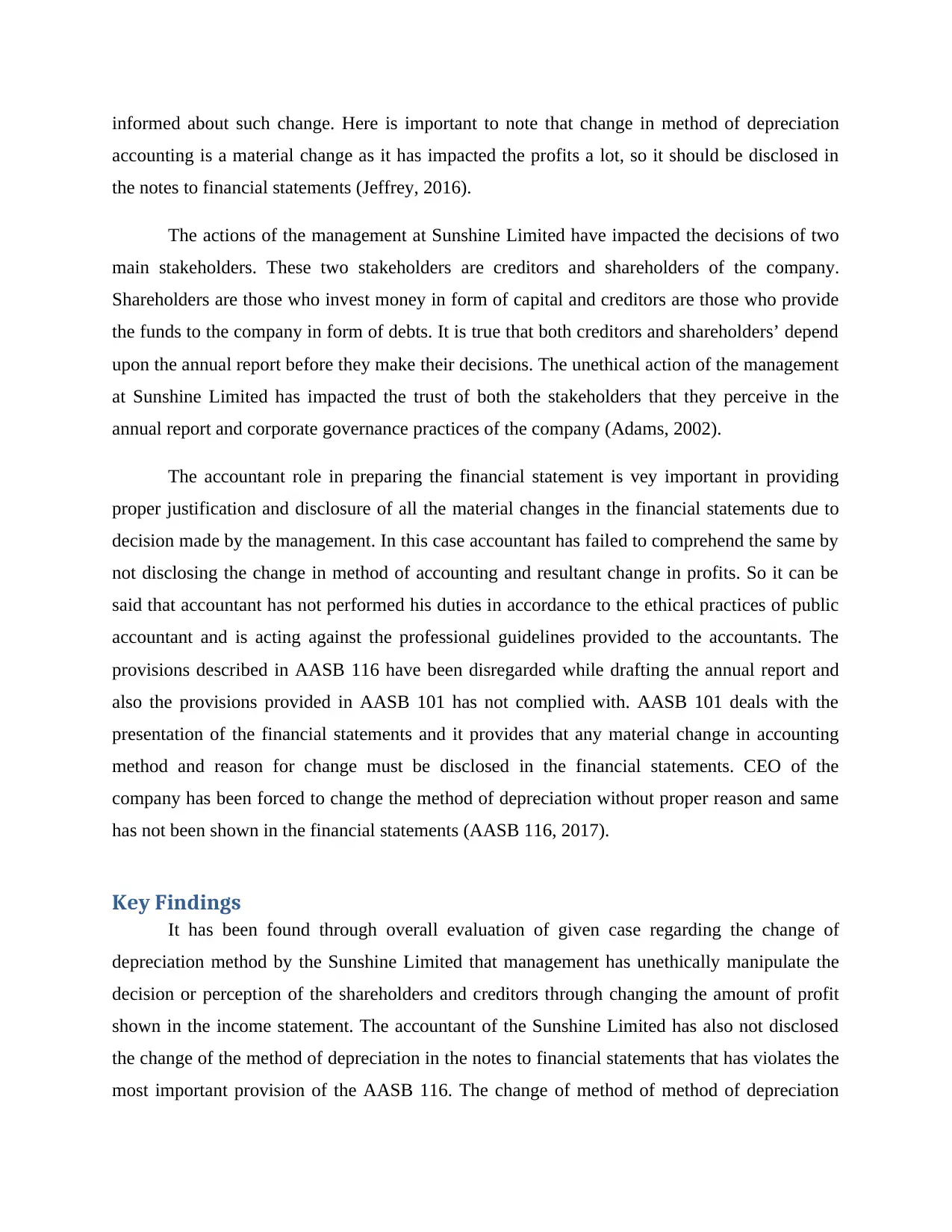
informed about such change. Here is important to note that change in method of depreciation
accounting is a material change as it has impacted the profits a lot, so it should be disclosed in
the notes to financial statements (Jeffrey, 2016).
The actions of the management at Sunshine Limited have impacted the decisions of two
main stakeholders. These two stakeholders are creditors and shareholders of the company.
Shareholders are those who invest money in form of capital and creditors are those who provide
the funds to the company in form of debts. It is true that both creditors and shareholders’ depend
upon the annual report before they make their decisions. The unethical action of the management
at Sunshine Limited has impacted the trust of both the stakeholders that they perceive in the
annual report and corporate governance practices of the company (Adams, 2002).
The accountant role in preparing the financial statement is vey important in providing
proper justification and disclosure of all the material changes in the financial statements due to
decision made by the management. In this case accountant has failed to comprehend the same by
not disclosing the change in method of accounting and resultant change in profits. So it can be
said that accountant has not performed his duties in accordance to the ethical practices of public
accountant and is acting against the professional guidelines provided to the accountants. The
provisions described in AASB 116 have been disregarded while drafting the annual report and
also the provisions provided in AASB 101 has not complied with. AASB 101 deals with the
presentation of the financial statements and it provides that any material change in accounting
method and reason for change must be disclosed in the financial statements. CEO of the
company has been forced to change the method of depreciation without proper reason and same
has not been shown in the financial statements (AASB 116, 2017).
Key Findings
It has been found through overall evaluation of given case regarding the change of
depreciation method by the Sunshine Limited that management has unethically manipulate the
decision or perception of the shareholders and creditors through changing the amount of profit
shown in the income statement. The accountant of the Sunshine Limited has also not disclosed
the change of the method of depreciation in the notes to financial statements that has violates the
most important provision of the AASB 116. The change of method of method of depreciation
accounting is a material change as it has impacted the profits a lot, so it should be disclosed in
the notes to financial statements (Jeffrey, 2016).
The actions of the management at Sunshine Limited have impacted the decisions of two
main stakeholders. These two stakeholders are creditors and shareholders of the company.
Shareholders are those who invest money in form of capital and creditors are those who provide
the funds to the company in form of debts. It is true that both creditors and shareholders’ depend
upon the annual report before they make their decisions. The unethical action of the management
at Sunshine Limited has impacted the trust of both the stakeholders that they perceive in the
annual report and corporate governance practices of the company (Adams, 2002).
The accountant role in preparing the financial statement is vey important in providing
proper justification and disclosure of all the material changes in the financial statements due to
decision made by the management. In this case accountant has failed to comprehend the same by
not disclosing the change in method of accounting and resultant change in profits. So it can be
said that accountant has not performed his duties in accordance to the ethical practices of public
accountant and is acting against the professional guidelines provided to the accountants. The
provisions described in AASB 116 have been disregarded while drafting the annual report and
also the provisions provided in AASB 101 has not complied with. AASB 101 deals with the
presentation of the financial statements and it provides that any material change in accounting
method and reason for change must be disclosed in the financial statements. CEO of the
company has been forced to change the method of depreciation without proper reason and same
has not been shown in the financial statements (AASB 116, 2017).
Key Findings
It has been found through overall evaluation of given case regarding the change of
depreciation method by the Sunshine Limited that management has unethically manipulate the
decision or perception of the shareholders and creditors through changing the amount of profit
shown in the income statement. The accountant of the Sunshine Limited has also not disclosed
the change of the method of depreciation in the notes to financial statements that has violates the
most important provision of the AASB 116. The change of method of method of depreciation
⊘ This is a preview!⊘
Do you want full access?
Subscribe today to unlock all pages.

Trusted by 1+ million students worldwide
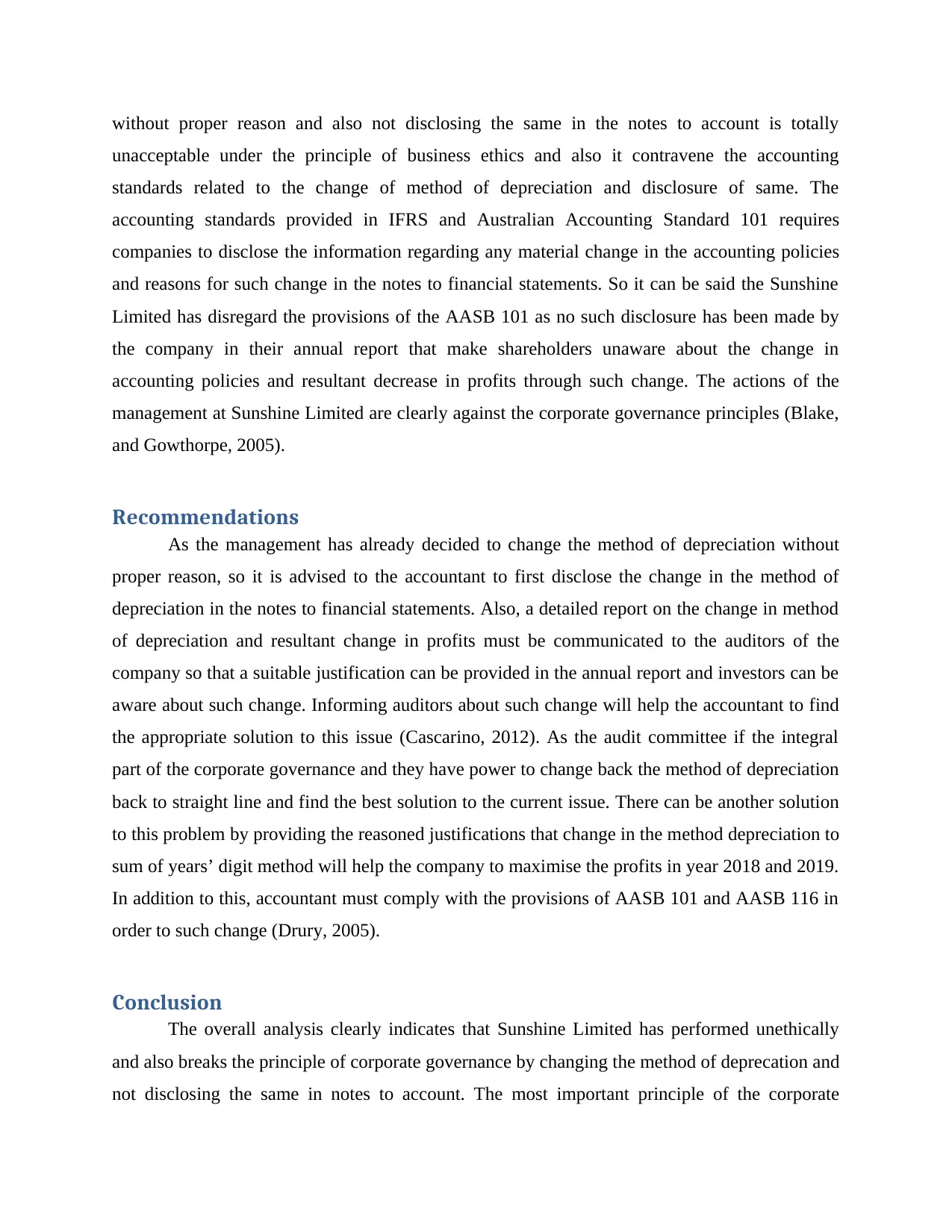
without proper reason and also not disclosing the same in the notes to account is totally
unacceptable under the principle of business ethics and also it contravene the accounting
standards related to the change of method of depreciation and disclosure of same. The
accounting standards provided in IFRS and Australian Accounting Standard 101 requires
companies to disclose the information regarding any material change in the accounting policies
and reasons for such change in the notes to financial statements. So it can be said the Sunshine
Limited has disregard the provisions of the AASB 101 as no such disclosure has been made by
the company in their annual report that make shareholders unaware about the change in
accounting policies and resultant decrease in profits through such change. The actions of the
management at Sunshine Limited are clearly against the corporate governance principles (Blake,
and Gowthorpe, 2005).
Recommendations
As the management has already decided to change the method of depreciation without
proper reason, so it is advised to the accountant to first disclose the change in the method of
depreciation in the notes to financial statements. Also, a detailed report on the change in method
of depreciation and resultant change in profits must be communicated to the auditors of the
company so that a suitable justification can be provided in the annual report and investors can be
aware about such change. Informing auditors about such change will help the accountant to find
the appropriate solution to this issue (Cascarino, 2012). As the audit committee if the integral
part of the corporate governance and they have power to change back the method of depreciation
back to straight line and find the best solution to the current issue. There can be another solution
to this problem by providing the reasoned justifications that change in the method depreciation to
sum of years’ digit method will help the company to maximise the profits in year 2018 and 2019.
In addition to this, accountant must comply with the provisions of AASB 101 and AASB 116 in
order to such change (Drury, 2005).
Conclusion
The overall analysis clearly indicates that Sunshine Limited has performed unethically
and also breaks the principle of corporate governance by changing the method of deprecation and
not disclosing the same in notes to account. The most important principle of the corporate
unacceptable under the principle of business ethics and also it contravene the accounting
standards related to the change of method of depreciation and disclosure of same. The
accounting standards provided in IFRS and Australian Accounting Standard 101 requires
companies to disclose the information regarding any material change in the accounting policies
and reasons for such change in the notes to financial statements. So it can be said the Sunshine
Limited has disregard the provisions of the AASB 101 as no such disclosure has been made by
the company in their annual report that make shareholders unaware about the change in
accounting policies and resultant decrease in profits through such change. The actions of the
management at Sunshine Limited are clearly against the corporate governance principles (Blake,
and Gowthorpe, 2005).
Recommendations
As the management has already decided to change the method of depreciation without
proper reason, so it is advised to the accountant to first disclose the change in the method of
depreciation in the notes to financial statements. Also, a detailed report on the change in method
of depreciation and resultant change in profits must be communicated to the auditors of the
company so that a suitable justification can be provided in the annual report and investors can be
aware about such change. Informing auditors about such change will help the accountant to find
the appropriate solution to this issue (Cascarino, 2012). As the audit committee if the integral
part of the corporate governance and they have power to change back the method of depreciation
back to straight line and find the best solution to the current issue. There can be another solution
to this problem by providing the reasoned justifications that change in the method depreciation to
sum of years’ digit method will help the company to maximise the profits in year 2018 and 2019.
In addition to this, accountant must comply with the provisions of AASB 101 and AASB 116 in
order to such change (Drury, 2005).
Conclusion
The overall analysis clearly indicates that Sunshine Limited has performed unethically
and also breaks the principle of corporate governance by changing the method of deprecation and
not disclosing the same in notes to account. The most important principle of the corporate
Paraphrase This Document
Need a fresh take? Get an instant paraphrase of this document with our AI Paraphraser
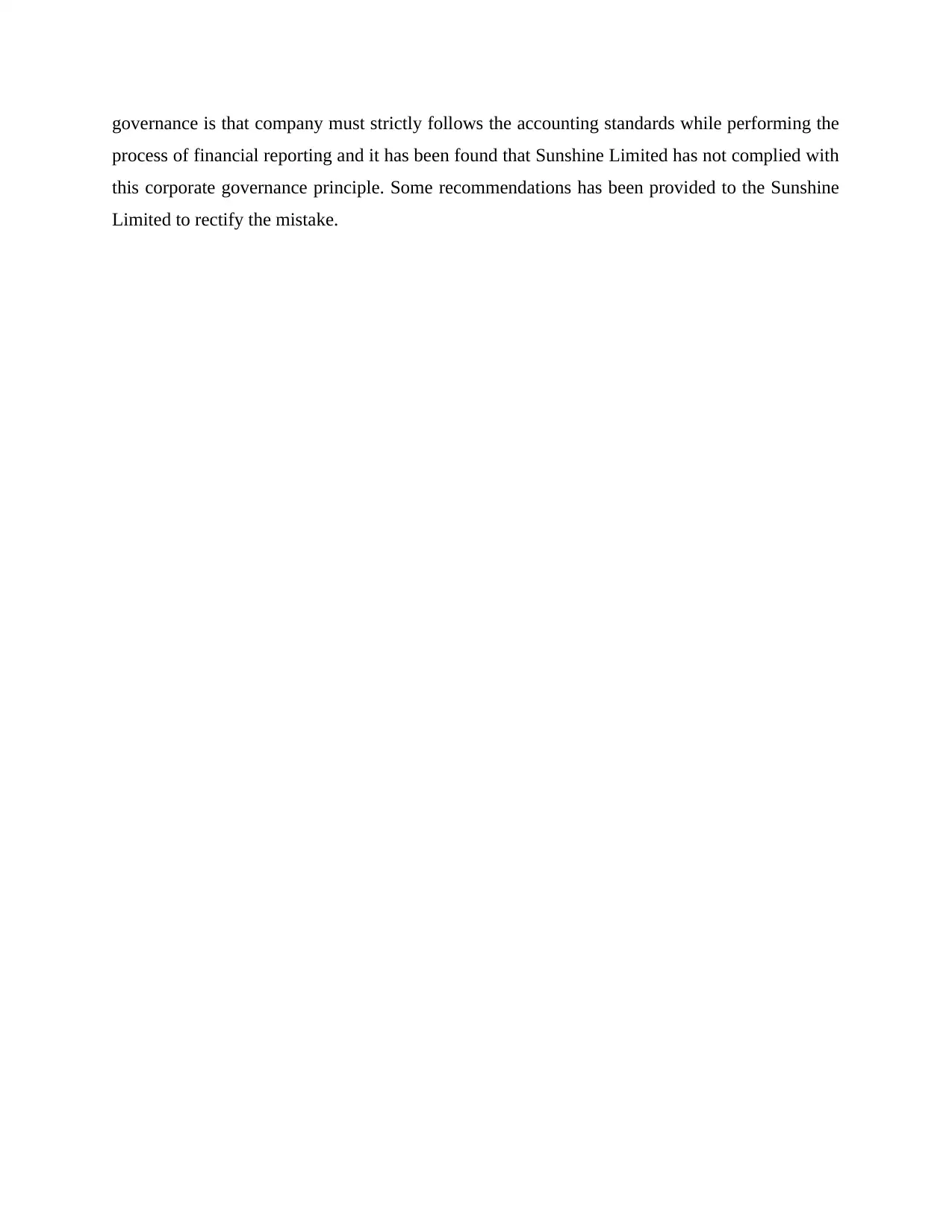
governance is that company must strictly follows the accounting standards while performing the
process of financial reporting and it has been found that Sunshine Limited has not complied with
this corporate governance principle. Some recommendations has been provided to the Sunshine
Limited to rectify the mistake.
process of financial reporting and it has been found that Sunshine Limited has not complied with
this corporate governance principle. Some recommendations has been provided to the Sunshine
Limited to rectify the mistake.
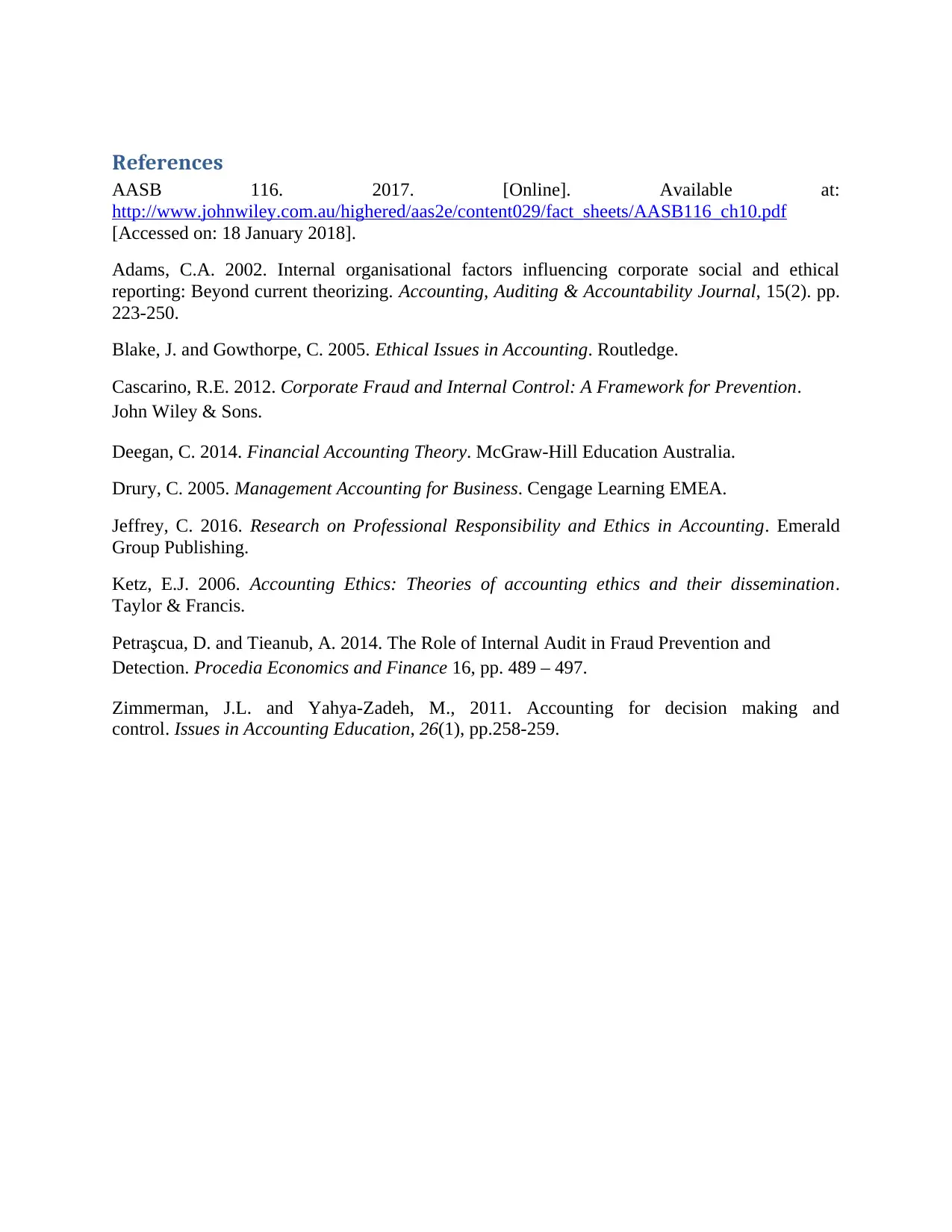
References
AASB 116. 2017. [Online]. Available at:
http://www.johnwiley.com.au/highered/aas2e/content029/fact_sheets/AASB116_ch10.pdf
[Accessed on: 18 January 2018].
Adams, C.A. 2002. Internal organisational factors influencing corporate social and ethical
reporting: Beyond current theorizing. Accounting, Auditing & Accountability Journal, 15(2). pp.
223-250.
Blake, J. and Gowthorpe, C. 2005. Ethical Issues in Accounting. Routledge.
Cascarino, R.E. 2012. Corporate Fraud and Internal Control: A Framework for Prevention.
John Wiley & Sons.
Deegan, C. 2014. Financial Accounting Theory. McGraw-Hill Education Australia.
Drury, C. 2005. Management Accounting for Business. Cengage Learning EMEA.
Jeffrey, C. 2016. Research on Professional Responsibility and Ethics in Accounting. Emerald
Group Publishing.
Ketz, E.J. 2006. Accounting Ethics: Theories of accounting ethics and their dissemination.
Taylor & Francis.
Petraşcua, D. and Tieanub, A. 2014. The Role of Internal Audit in Fraud Prevention and
Detection. Procedia Economics and Finance 16, pp. 489 – 497.
Zimmerman, J.L. and Yahya-Zadeh, M., 2011. Accounting for decision making and
control. Issues in Accounting Education, 26(1), pp.258-259.
AASB 116. 2017. [Online]. Available at:
http://www.johnwiley.com.au/highered/aas2e/content029/fact_sheets/AASB116_ch10.pdf
[Accessed on: 18 January 2018].
Adams, C.A. 2002. Internal organisational factors influencing corporate social and ethical
reporting: Beyond current theorizing. Accounting, Auditing & Accountability Journal, 15(2). pp.
223-250.
Blake, J. and Gowthorpe, C. 2005. Ethical Issues in Accounting. Routledge.
Cascarino, R.E. 2012. Corporate Fraud and Internal Control: A Framework for Prevention.
John Wiley & Sons.
Deegan, C. 2014. Financial Accounting Theory. McGraw-Hill Education Australia.
Drury, C. 2005. Management Accounting for Business. Cengage Learning EMEA.
Jeffrey, C. 2016. Research on Professional Responsibility and Ethics in Accounting. Emerald
Group Publishing.
Ketz, E.J. 2006. Accounting Ethics: Theories of accounting ethics and their dissemination.
Taylor & Francis.
Petraşcua, D. and Tieanub, A. 2014. The Role of Internal Audit in Fraud Prevention and
Detection. Procedia Economics and Finance 16, pp. 489 – 497.
Zimmerman, J.L. and Yahya-Zadeh, M., 2011. Accounting for decision making and
control. Issues in Accounting Education, 26(1), pp.258-259.
⊘ This is a preview!⊘
Do you want full access?
Subscribe today to unlock all pages.

Trusted by 1+ million students worldwide
1 out of 9
Related Documents
Your All-in-One AI-Powered Toolkit for Academic Success.
+13062052269
info@desklib.com
Available 24*7 on WhatsApp / Email
![[object Object]](/_next/static/media/star-bottom.7253800d.svg)
Unlock your academic potential
Copyright © 2020–2025 A2Z Services. All Rights Reserved. Developed and managed by ZUCOL.





